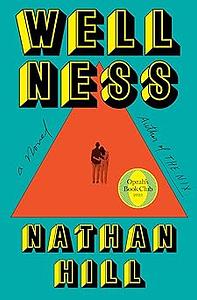You need to sign in or sign up before continuing.
Take a photo of a barcode or cover
challenging
dark
emotional
informative
mysterious
reflective
sad
tense
slow-paced
Plot or Character Driven:
Character
Strong character development:
Yes
Loveable characters:
Complicated
Diverse cast of characters:
Yes
Flaws of characters a main focus:
Yes
The last 40 pages of this almost 600 page book was the best part.
challenging
dark
emotional
funny
hopeful
reflective
sad
tense
slow-paced
Plot or Character Driven:
Character
Strong character development:
Yes
Loveable characters:
Yes
Diverse cast of characters:
No
Flaws of characters a main focus:
Yes
funny
reflective
medium-paced
Plot or Character Driven:
Character
Strong character development:
Complicated
Loveable characters:
No
Diverse cast of characters:
No
Flaws of characters a main focus:
Yes
I liked “Wellness” as a book of ideas, ; there are some fascinating concepts at play, largely to do with self-denial, both willful and unconscious, and how it affects every part of our lives. There are also numerous perceptive observations about patterns of behavior that can be very difficult to understand, such as Christian extremism and internet conspiracy theorizing. It’s frequently funny and when Hill hits his stride his work is as compelling as anything.
But it feels like six or seven books that didn’t know know how to share the same covers. Hill wants to pull off the sort of tonal and POV dexterity that history’s greatest writers might have failed at. Entire chapters zeroing deeply into topics with a textbook’s coldness, revealing the purpose at the end of a chapter or section with revelations that consistently play like punchlines. Hill dramatically black boxes so much of “Wellness” for no reason other than to drop these WHOA moments, a form of selective exposition that bothers me, particularly when it’s so transparent.
But I do like it and find myself thinking a lot about it, particularly about naming choices for dildos.
But it feels like six or seven books that didn’t know know how to share the same covers. Hill wants to pull off the sort of tonal and POV dexterity that history’s greatest writers might have failed at. Entire chapters zeroing deeply into topics with a textbook’s coldness, revealing the purpose at the end of a chapter or section with revelations that consistently play like punchlines. Hill dramatically black boxes so much of “Wellness” for no reason other than to drop these WHOA moments, a form of selective exposition that bothers me, particularly when it’s so transparent.
But I do like it and find myself thinking a lot about it, particularly about naming choices for dildos.
I went back and forth on deciding whether or not I liked this book. The backstory tangents were awful to read, and I would have much rather stayed in the present storyline, BUT once I finished it, I can say I’ve read nothing else like it. The emotions and relationship dynamics felt very real. Would I recommend? No, but I didn’t hate it.
If there is such a thing as a domestic systems novel, here's a greatly entertaining example. Hill offers close first-person interiors of a couple who aren't quite neurotic enough to be Franzen characters and places them in conversation, or tension, with characters piped in from Updike (a smug, deluded and judgmental fellow mom; a polyamorous couple) and DeLillo (a shape-shifting businessman) and Franzen (some terrible parents). These figures outline an array of blinkered worldviews, into which the couple, individually and together, fail to fit. That they shouldn't anyway, and that this is obvious enough, will strike some — such as the writer Andrew Martin, reviewing Wellness in the NYT — as too schematic or pat. He writes:
I don't disagree, but I also don't think there's any getting to the bottom of "the modern predicament." Not in a novel and not in life. And I don't think anyone has his or her problems solved here. Rather, we are reminded that perhaps occasional sudden radical increases in recognition — of meaning, of circumstance, of context, of self, of someone else's value — are as much as anyone's going to get most of the time. If deriving a little joy from seeing an especially well-crafted enactment of one journey toward such recognition — in a novel built to mirror the reader's awareness of the modern predicament, and of its insolubility — is wrong, I don't want to be right.
Hill is less interested in getting to the bottom of the modern predicament than he is in constructing an elaborate, back-story-laden plot machine that will, after hundreds of pages, solve all its characters’ problems with a series of satisfying clicks.
I don't disagree, but I also don't think there's any getting to the bottom of "the modern predicament." Not in a novel and not in life. And I don't think anyone has his or her problems solved here. Rather, we are reminded that perhaps occasional sudden radical increases in recognition — of meaning, of circumstance, of context, of self, of someone else's value — are as much as anyone's going to get most of the time. If deriving a little joy from seeing an especially well-crafted enactment of one journey toward such recognition — in a novel built to mirror the reader's awareness of the modern predicament, and of its insolubility — is wrong, I don't want to be right.
dark
emotional
funny
reflective
slow-paced
Plot or Character Driven:
A mix
Strong character development:
Yes
Loveable characters:
No
Diverse cast of characters:
No
Flaws of characters a main focus:
Yes
I thought this was going to be a feel-good love story, but it turned out to be a story about how weird love can make us feel. The best part is, we can’t explain why!
This book really made me question personal development, to what is extent is the self just a blob that based on trauma and defense mechanisms and trying to move on from the past? On the flip side, how much are we as individuals, the product of the experiences we have with other people. I really believe that sometimes people enter our lives and then they leave, though there is the occasional person who comes into our life and changes us, and that’s where I think Jack and Elizabeth’s story shines.
I think if there was another 100 pages, I would kind of feel like they should get divorced? But I like to believe that love wins all.
This book really made me question personal development, to what is extent is the self just a blob that based on trauma and defense mechanisms and trying to move on from the past? On the flip side, how much are we as individuals, the product of the experiences we have with other people. I really believe that sometimes people enter our lives and then they leave, though there is the occasional person who comes into our life and changes us, and that’s where I think Jack and Elizabeth’s story shines.
I think if there was another 100 pages, I would kind of feel like they should get divorced? But I like to believe that love wins all.
emotional
reflective
sad
slow-paced
Plot or Character Driven:
Character
Strong character development:
Complicated
Loveable characters:
No
Diverse cast of characters:
No
Flaws of characters a main focus:
Yes
emotional
informative
inspiring
reflective
medium-paced
Plot or Character Driven:
A mix
Strong character development:
Yes
Loveable characters:
Yes
Diverse cast of characters:
Complicated
Flaws of characters a main focus:
Complicated
emotional
funny
lighthearted
reflective
sad
medium-paced
Plot or Character Driven:
Character
Strong character development:
Yes
Loveable characters:
Yes
Diverse cast of characters:
No
Flaws of characters a main focus:
Yes




